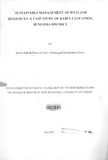| dc.description.abstract | Wetlands serve multi purpose functions that have physical, ecological as well as Socioeconomic
values. However, these values are threatened by the increasing human activities
such as livestock rearing, settlement, urbanization, industrialization and deforestation. Small
scale wetlands owned by individuals have been given little attention in studies and in the
policy framework. However, these wetlands face greater threats of extinction. This prompted
this study in Kabula Location of Bung om a District.
The objectives of the study were: to establish the functions of the wetlands in Kabula
Location; appraise the values the community attach on wetlands; analyze the issues arising
from utilization and management of the wetlands in Kabula Location, and to propose
strategies for their sustainable management.
Primary and secondary methods Of data collection were used during the study. These
included literature review, interviews, administering questionnaires, observation,
photography, survey and mapping. Quantitative and qualitative data analysis techniques were
used. These included the Chi-square, Spearman's rank correlation, Spearman's product
moment correlation, means, variance, totals and discussions.
The analysis revealed that the community in Kabula Location relies on wetlands for basic
needs such as water, fuelwood and building materials. Wetlands also serve economic puposes
such as sugar cane farming, maize "farming and livestock grazing. Growth of Eucalyptus trees
also takes a good part of the wetland acreage. The economic uses are the greatest threats to
wetlands. The other use is socio-cultural activities such as circumcision ceremonies,
recreation, collection of herbs, vegetables and materials, bathing and washing are friendlier
to the wetland ecology. The community values wetlands as their own resources .
The study has proposed strategies that promote uses reinforcing economic and socio-cultural
functions of the wetlands and which could enhance of their conservation. It is through the
integration of utility of wetlands and conservation objectives that their sustainability can be
achieved | en |

